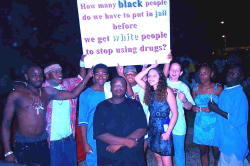Feature:
Federal
Bill
to
Rein
in
Anti-Drug
Task
Forces
Introduced
in
Response
to
Tulia
Scandal
5/27/05
Five years after 15% of the black population of small-town Tulia, Texas, was rolled-up in a cocaine bust conducted by a rogue lawman working for Texas drug task force, the reverberations from those arrests have arrived on Capitol Hill. After years of a harsh national spotlight focused on the strange workings of justice in the Texas panhandle town, where now disgraced narc Tom Coleman made cases based on nothing but his own word, Tulia became a national symbol of drug war law enforcement run amok and brought into stark relief the workings of the more than 700 federally-funded regional anti-drug task forces. Now, revulsion with the excesses of the task forces has manifested itself with a bill introduced Wednesday that could cut off hundreds of millions of dollars annually in federal funding for the task forces.
And that's just the tip of the iceberg. A 2002 report from the ACLU of Texas found at least 17 scandals involving the Byrne-funded task forces, including cases of falsifying government records, witness tampering, fabricating evidence, stealing drugs from evidence lockers, selling drugs to children, large-scale racial profiling, sexual harassment, and other abuses of official capacity. Scandals elsewhere include the misuse of millions of dollars in federal grant money in Kentucky and Massachusetts, false convictions based on police perjury in Missouri, and making deals with drug offenders to drop or lower their charges in exchange for money or vehicles in Alabama, Arkansas, Georgia, Massachusetts, New York, Ohio, and Wisconsin. Sponsored by Rep. Sheila Jackson Lee (D-TX), with cosponsors John Conyers (D-MI), Charles Rangel (D-NY), Donald Payne (D-NJ), and Edolphus Towns (D-NY), the "No More Tulias: Drug Law Enforcement Evidentiary Standards Improvement Act of 2005" is designed to force states to tighten controls over the task forces or lose the Byrne funds for them. In particular, the bill would bar states from spending money on the regional task forces unless the state passes a law preventing people from being convicted of drug offenses when the only evidence against them is the uncorroborated testimony of a law enforcement officer or informant. Byrne grant money would still be available for other, non-law enforcement activities, such as drug treatment and domestic violence prevention.
"Until now, these drug task forces around the country haven't had to answer to anyone," said Jesselyn McCurdy, an ACLU Legislative Counsel. "As a result of this lack of state and federal oversight, they've been at the center of the some of the country's most egregious law enforcement abuse scandals. This legislation would put checks and balances on their unfettered power and make sure citizens aren't rounded up based on uncorroborated testimony, or their race. The law enforcement agents involved in these scandals weren't just a few bad apples," McCurdy said. "The lack of checks and balances, and corroboration of testimony, set the stage for abuse. This legislation is an important step in eliminating the racial profiling, corruption and lack of oversight that lets scandals like Tulia exist." "This is something we've needed for a long time: a law enforcement reform bill," said Nora Callahan, executive director of the November Coalition, an anti-prohibitionist group working to free prisoners of the war on drugs. "We have a police problem in this country, and with the introduction of this bill we are beginning to address it," she told DRCNet. "We are beginning the long overdue discussion of the way police investigate drug crimes, or is it the way police create drug crimes? With these task forces and their stings, handing out cash and drugs, they take an entrepreneurial person in a capitalist society and set him up, and then when he gets big enough, they bust him as kingpin," she said. "There is a lot of talk about sentencing reform, but that is the back end," Callahan continued. "What people don't realize is that sentencing begins at the time of investigation, when the police find a guy selling drugs and then let him continue until he reaches the sentencing level they want. We need reform on the front end, we need reforms in the way the police operate, and this bill begins to do that." "Congress needs to pass Representative Jackson Lee's bill in order to prevent more innocent people from going to jail," said Bill Piper, director of national affairs for the Drug Policy Alliance. "Liberals and conservatives agree, the federal Byrne grant program is doing more harm than good." Both the ACLU and the Drug Policy Alliance are among the dozens of civil rights, civil liberties, religious, and drug and legal reform groups that have endorsed the bill, and while the sponsors of the new federal legislation are all Democrats, the campaign to rein in the task forces has won support from Christian conservatives, especially in Texas, where right-leaning state legislators allied themselves with the Texas ACLU and the NAACP to successfully win passage of a bill outlawing drug convictions based solely on the testimony of an informant. Nationally, five leading conservative groups -- American Conservative Union, Americans for Prosperity, Americans for Tax Reform, Citizens against Government Waste, and National Taxpayers Union -- have issued a sign-on letter calling on Congress to urge the Bush administration to completely de-fund the Byrne grant program because it "has proved to be an ineffective and inefficient use of resources." But while law enforcement and congressional drug warriors such as Rep. Mark Souder (R-IN) are squealing like stuck pigs over the budget proposal and will probably be able to get the funding restored, the Tulia bill opens a new line of attack of funding of the roving task forces. Now, bill supporters are attempting to put pressure on Senate Judiciary Committee chairman Rep. James Sensenbrenner (R-WI) to hold hearings on the bill this year. Two years ago, in the face of withering columns on Tulia by New York Times columnist Bob Herbert, Sensenbrenner pledged to hold hearings on the issue of task force abuses. That hasn't happened yet, and the coalition of groups supporting the bill is calling Sensenbrenner on it. "Two years ago, you pledged to hold a formal Judiciary Committee hearing on the causes of the abuses in Tulia," the groups wrote in a letter to the congressman. "Your spokesperson at the time pledged that you would initiate "active and aggressive oversight of the federal task force" responsible for hiring the rogue cop in Tulia. The introduction of this bill represents the perfect opportunity for the expeditious scheduling of the promised Judiciary Committee hearing." That would be nice, said Bean. "When I got into this fight, the issue of corroboration was key. If my kid were accused of selling drugs, I would want more evidence than some guy's word," said Bean. "It's fundamentally unfair to prosecute people based on evidence so shoddy. Seeing people convicted on such flimsy evidence provided my first insight into what's wrong with the drug war. It was just such a fundamental injustice. And it's not just Tulia," said Bean. "The only unusual thing about Tulia is we had a spectacularly sleazy cop and so many black people arrested. A big bust in a small town. But what went on there is pretty much business as usual all across the country."
| |||||||||||||||||||||||||||||||||||||||||||||||||||||||||||||||||||||||||||||||||


